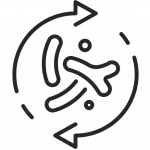Headaches – is stress to blame?

Got a headache again? As if nothing crazy, but the sense of well-being is damaged. And it can be day after day. Headaches are one of the most common symptoms that patients complain about to their family doctors. The most common headache that almost everyone has experienced, what we call “normal” or “everyday” pain, is characterized by a feeling of tension or tension, and is usually caused by stress and other emotional factors. Is it possible to reduce this symptom and improve the quality of life?
How common are headaches?
Different types of headaches occur in almost every second person in the world. Tension-type headaches, which also include migraines, are the most common type of headache that many people are unfortunately familiar with as the pace of life these days becomes increasingly fast-paced and stressful.
Incidence of headache in adults in Europe:
- 60% experience tension-type headaches
- 15% experience migraine
- 4% live with chronic headaches
- 2% experience medication-related headaches
Tension-type headache is a widespread problem that reduces work capacity and impairs the overall quality of life, especially when this pain is chronic. Pain is considered chronic if it lasts for more than 6 months. Very often, depression , irritability, anxiety, panic and bipolar disorders also come along with chronic pain . Therefore, when diagnosing and treating headaches, it is important to detect and treat depression in time, if it is present.
How does a tension-type headache manifest itself?
Tension headaches usually do not cause nausea, vomiting, and sensitivity to light. A tension headache is characterized by a constant, rather than throbbing, pain that causes pain on both sides of the head. Tension headaches can be episodic or chronic. If headaches are experienced less than 15 days a month, they are called episodic, and if more often – chronic. Headaches can last from 30 minutes to several days.
Tension headaches are characterized by:
- slow onset of headache
- the head usually hurts on both sides
- the feeling of pain is like a “pressing hoop around the head”
- the pain is in both the head and the back of the neck
- the pain is mild to moderate
- During a tension-type headache, it is often possible to continue the daily activities that have been started

What are the main causes?
Stress and muscle tension (muscle spasms in the head and neck) are considered a major factor in the development of tension headaches. Also, visual strain and prolonged sitting at the computer can contribute to the occurrence of headaches. However, the exact mechanism of tension headache is unknown. People often get this type of headache after a day full of tension, excitement and stress.
Everyday activities such as staring at a computer or phone screen for long periods of time and driving as part of a long commute often cause people to “hold their stress” in their shoulders and back. Unfortunately, these things are a natural part of our daily lives, and as a result, tension headaches only increase.
While it is true that muscle and tissue tension in the back of the head and neck is often the main contributing factor to tension headaches, the main culprits are actually the nerves in these regions. Muscles in the head and neck tighten around the occipital nerves, which contributes to the pain, and the discomfort of these headaches only creates more tension. This causes a never-ending cycle of pain – where tight muscles cause pain in the occipital nerves, and the pain causes the muscles to tighten even more – so tension headaches can often last up to four hours or several days.
Can poor sleep cause tension headaches?
Many people blame their headaches on “poor sleep,” but research has not shown a direct link between tension headaches and a lack of quality sleep. However, fatigue resulting from poor sleep can increase a person’s chance of developing episodic tension headaches. It has been found that sleeping in too cold a room or sleeping with your neck in an uncomfortable position can also trigger tension headaches.
Even though poor sleep is not the direct cause of tension headaches, it is often one of the side effects of these headaches, as the pain can directly affect a person’s ability to fall asleep and get a good night’s sleep.

Why are they called stress headaches?
Many studies have shown a link between the intensity of stress and the frequency of tension headaches, which is why they are often referred to as tension headaches. In fact, stress contributes to any type of headache, but it is most closely associated with tension headaches.
What is stress after all ? Generally, we think of it as the psychological strain and depression that is usually felt when life’s complications are too much. Physiologically, stress is defined as a non-specific reaction of the organism to any demand placed on the organism: emotionally very strong irritation, signal or problem situation.
Stress most often occurs in situations when demands or tasks seem too heavy for us, or when we feel overwhelmed by the feeling of being judged. Then the stress reaction manifests itself in many symptoms, among which are: anxiety, nervousness, irritability, anxiety, fear, muscle tension, nausea, headache, etc.
Stress manifests itself in its own way for everyone, and if it can motivate one person to act, then it can embarrass or shock someone else, damaging their judgment and ability to act.
How to treat tension headaches?
Pain is important for human survival because it warns that something is wrong in the body. If the headache bothers you and you cannot determine its cause, you should definitely consult a doctor to find out whether the headache is a warning symptom of another disease.
Common over-the-counter pain relievers and anti-inflammatories are effective for tension headaches, but remember not to use them too often (more than two days a week). If headaches appear regularly, you should see a doctor who will determine the best method of treatment.
The doctor’s first task is to determine which type of headache it is, as treatment tactics differ. The choice of medication depends on the type of headache and the experience of previously used medications, as well as on existing co-morbidities. In addition to medication, various types of therapy, such as massage, acupuncture and cryotherapy (ice pack on the neck), also help to prevent tension headaches.
How important is prevention?
In the case of tension headaches, habits and lifestyle in general play a very important role. Adherence to the daily regime should be very important in the life of headache patients: a balanced rhythm of work and rest, regular meals and sufficient amount of water. Walking and other physical activities have a beneficial effect, which will help not only maintain a healthy physical body and fight the effects of stress, but also increase a person’s resistance to pain irritations and stress.
Some suggestions for preventing tension headaches:
- go to bed and wake up at the same time every day
- exercise regularly (at least 30 min a day)
- have regular meals
- if necessary, rest in a quiet, peaceful environment
- create a ritual to reduce stress, anxiety (yoga, massage or relaxation exercises)
- change the pillow or sleeping position if it is not comfortable
- practice correct body posture when working at the computer, watching TV, reading, etc.
- performs frequent neck and shoulder exercises if the work is related to their load
- dress warmly if the headache is associated with cold
- devote sufficient time to sleep and rest










